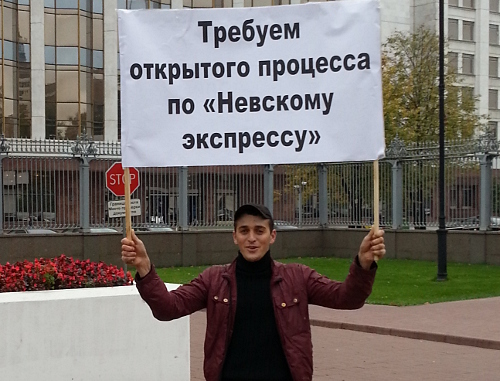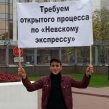
Insurgents and Protesters Alike Challenge Ingush Authorities
Publication: Eurasia Daily Monitor Volume: 9 Issue: 185
By:

October in Ingushetia started off in the usual way, with routine shootouts and attacks on military personnel. There were, however, more important events for the republican government to attend to, such as the picketing that the Ingush opposition managed to stage in Moscow. The governor of Ingushetia, Yunus-Bek Yevkurov, was perhaps among those least willing to see such protest activity in Moscow. When members of the Ingush opposition tried to stage protests in Moscow in May demanding Yevkurov’s resignation, the Ingush leader became hysterical, going on TV to call the organizers of the protests indecent people and stating that true Ingush people would never do such a thing. Yevkurov further demanded that the relatives of the protesters bring the protesters’ activities under control or face punishment themselves (https://www.angusht.com/news/index.php?news=69042). This Yevkurov reaction was due to the fact that he did not want to air Ingushetia’s dirty laundry in public.
This time, the Ingush opposition picketed the Russian State Duma and the Russian government building in Moscow under the slogans: “Ingushetia is Not a Military Exercise Ground. We Are Tired of Military Boots”; “Law Enforcement Turns a Blind Eye to Corruption in Ingushetia’s Leadership; “Ingushetia’s Leadership Turns Blind Eye on Extralegal Executions.” Twenty-one people took part in the Moscow protests (https://ingushetiyaru.org/news/24445). The participants had little to lose: they were people who had lost all hope of finding their kidnapped relatives or the perpetrators of the crimes against them. According to one of the protest participants, Sultan-Girei Khashegulgov, they wanted to attract the attention of the federal authorities and Russian public to what is going on in Ingushetia. This protest appeared to be much more effective than the previous one, as the Russian Federation Council agreed to meet the protesters on the very first day of the protests. However, there are few hopes this meeting will improve the situation in Ingushetia in any way.
Against the background of the picketing in Moscow, the clash in Ingushetia’s Sunzha district was pushed to the level of news of secondary importance. In the meantime, attacks on military and police forces have become virtually continuous in this area. On October 3, it was initially announced that militant forces clashed with police at about 1 p.m. One police officer was killed and three more were wounded in the incident (www.regnum.ru/news/kavkaz/ingush/1577396). According to a republican police source, the group of militants numbered eight to ten. By the evening of October 3, the media was reporting that not one, but four police officers were killed in the clash and two other police officers were wounded. Chechen government forces assessed the size of the militant group to be between five to eight persons (www.kavkaz-uzel.ru/articles/213545/). According to the Chechen side, police officers were ambushed by the rebels, coming under fire from two sides, which resulted in large losses. According to eyewitnesses, the area where the rebels were hiding was shelled massively using artillery and tanks, and bombed by military jets. The rumble of the bombing was heard in Alkhan-Yurt, which is 70 kilometers away from the scene: local residents there wondered on Facebook which part of Chechnya was under attack and what exactly was going on. However, people at the scene of the shelling were unable to communicate the news since the government turned off cellular networks to prevent the rebels from communicating (www.regnum.ru/news/kavkaz/ingush/1577668). There was no news of losses among the militants for several days after the massive shelling.
The area in question, between the villages of Dattykh, Arshty and Bamut, is a kind of “Bermuda triangle” for the Russian military and Chechen and Ingush police. Attacks in this zone have taken place for years now. Government forces have suffered heavy casualties, but have not been able to do much to counter these attacks. The hallmark of the rebel attacks in this sector is that they are staged exclusively in broad daylight rather than at night. Part of the reason for this is that neither the military nor the Federal Security Service (FSB)—much less the local police—dare enter the area at night; they only come to the area during the day. So the militants cannot really attack anyone at night, since the government forces are not allowed into the area. It must also be noted that the leader of the North Caucasian rebels, Doku Umarov, is presumably hiding in this area as well.
The FSB publishes reports several times per year claiming that various leaders of the rebel movement have been eliminated. However, they do not explain why the rotation of the insurgency’s leaders does not affect its capabilities (www.ria.ru/spravka/20121004/766280084.html). The only exception to this rule was the arrest and capture of the Ingush jamaat leader Emir Magas back in June 2010, but that was related to the Ingush jamaat’s peculiar structure. In contrast to other North Caucasian jamaats, the cells of the Ingush jamaat were directly connected to its Emir. In other North Caucasian jamaats, there are also layers of mid-level commanders, which make it possible for those jamaats to lose leaders but still survive. That is why Ingushetia’s government has grounds to state that the intensity of clashes in the republic has decreased dramatically since the arrest of Emir Magas (aka Yevloev, Taziev). Yet, joint actions of the Ingush and Chechen jamaats in the border area between Chechnya and Ingushetia are causing significant problems for the authorities. Doku Umarov likely operates the Ingush jamaat directly now, and this will continue for some time. This situation will create more trouble in the coming months for the Ingush authorities, as well as their counterparts elsewhere in the region, as the Bermuda triangle of the insurgency intensifies.




